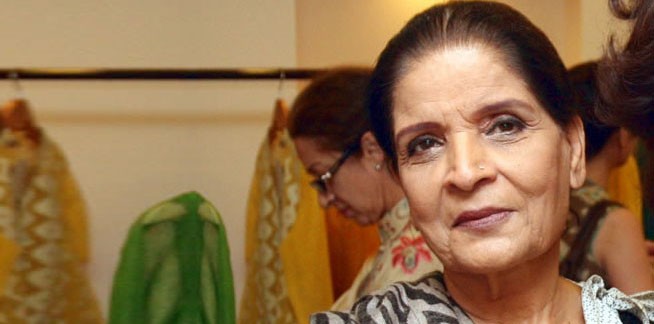

The image went viral on all social media sites almost immediately. Pakistan’s beloved and sagacious-looking Zubaida Tariq, or Zubaida Apa, clad in a white sari, gazed into the camera with a slight, mysterious smile. The product she was selling was a soap that promised to miraculously whiten the skin of the entire country.
The image riled people to no end and an almost unanimous wave of condemnation poured in on Twitter and Facebook.
The TVC that followed didn’t make things any better. Sad looking damsels merely existing through life with vacant eyes and dejected postures gave way to the benevolent, caring mother hen who, in a desire to make them happy, gave them a solution to become fairer -- and, thus, beautiful. Though the women were the centrepiece of the ad, it didn’t limit itself to one gender. In the start and at the end, glimpses of men momentarily flashed on the screen. But more disturbingly, one of the final shots also displayed a boy and two girls -- one as young as five or six -- standing behind Zubaida Apa and chanting ‘ab gora ho ga Pakistan’ (now Pakistan will become white).
Growing up, we have all been witness to such ads, especially about fairness creams. Over the years, though some cricketers in Pakistan have endorsed products that promise fair skin, the female market -- the biggest potential buyers’ group -- had not yet been targeted with celebrity endorsement. Sure, there had been ads where a B-list female actor swore that she became gori after 15 minutes of using a bleach cream, but we laughed it off and didn’t take her seriously. Other ads featuring young girls whose path to success was hinged on their ‘fairness’ prickled us, but didn’t raise our ire.
Then, one wonders, why this particular ad, among all the others, has caused so much rage on social media.
Here’s the thing: celebrities, specifically those whose fame is based on advising people on domestic lifestyles, have credibility in people’s eyes and, thus, should have a sense of social responsibility. It is harmless enough for an actor to endorse a shampoo that claims to make your hair shinier, or a sportsman to sip a cup of tea promising to be the most refreshing you’ve ever had.
But skin fairness products that play on our deep-rooted obsession with being ‘white’ dehumanises women, lowering them to the level of their ‘packaging’. It reeks of the class divide perpetuated and reinforced through our skin tone. It pressurises people into desiring for something not natural to most of us -- like an obsession with size zero for which our South Asian body shapes are not structured.
As with many other things, our neighbours to the East are ahead in this debate. In 2009, a women’s rights group Women of Worth launched a counter campaign titled "Dark is beautiful". It didn’t gain much attention till Nandita Das lent voice to it in 2013 with the slogan "Stay Unfair, Stay Beautiful". Das, who over the years has consistently refused to let her skin be lightened for a film role has repeatedly talked about this trend of skin tone reinforcing class divide.
In an interview to Mumbai Mirror in July 2013, she said: "Whenever I have to play a middle class or upper middle class woman, I am told, ‘I know you don’t like being white or fair but can you make your skin a little lighter? The rural, lower class women are dark but now that you are playing an educated professional…’".
So, when a well-respected celebrity like Zubaida Apa not only endorses a product perpetuating this divide and insecurity, but literally stamps her name on it, it is time to stop laughing it off and call her out on it.
Recently, PEMRA has published multiple ads in newspapers which, among other things, have consistently warned its licensees to not use misleading/false advertisements. This is something which Pakistan’s Advertising Association has also cautioned its members in its code of conduct. But such warnings and pledges have yet to turn into concrete action.
In all the myriad of cultural insecurities within which we exist, the dream of a fairer skin is probably one of the worst ones to have because it centres on an unachievable goal. At the very least we need a debate about the extent to which we are accepting of brands and their endorsers in their attempts to monetise on insecurities arising out of our racist attitudes.
The advertisers are now targeting children and unless we counter this narrative by another equally strong one extolling the beauty of darker skin, our skin, generations after us will continue to live in shame of their skin that is a marker of our South Asian identity.